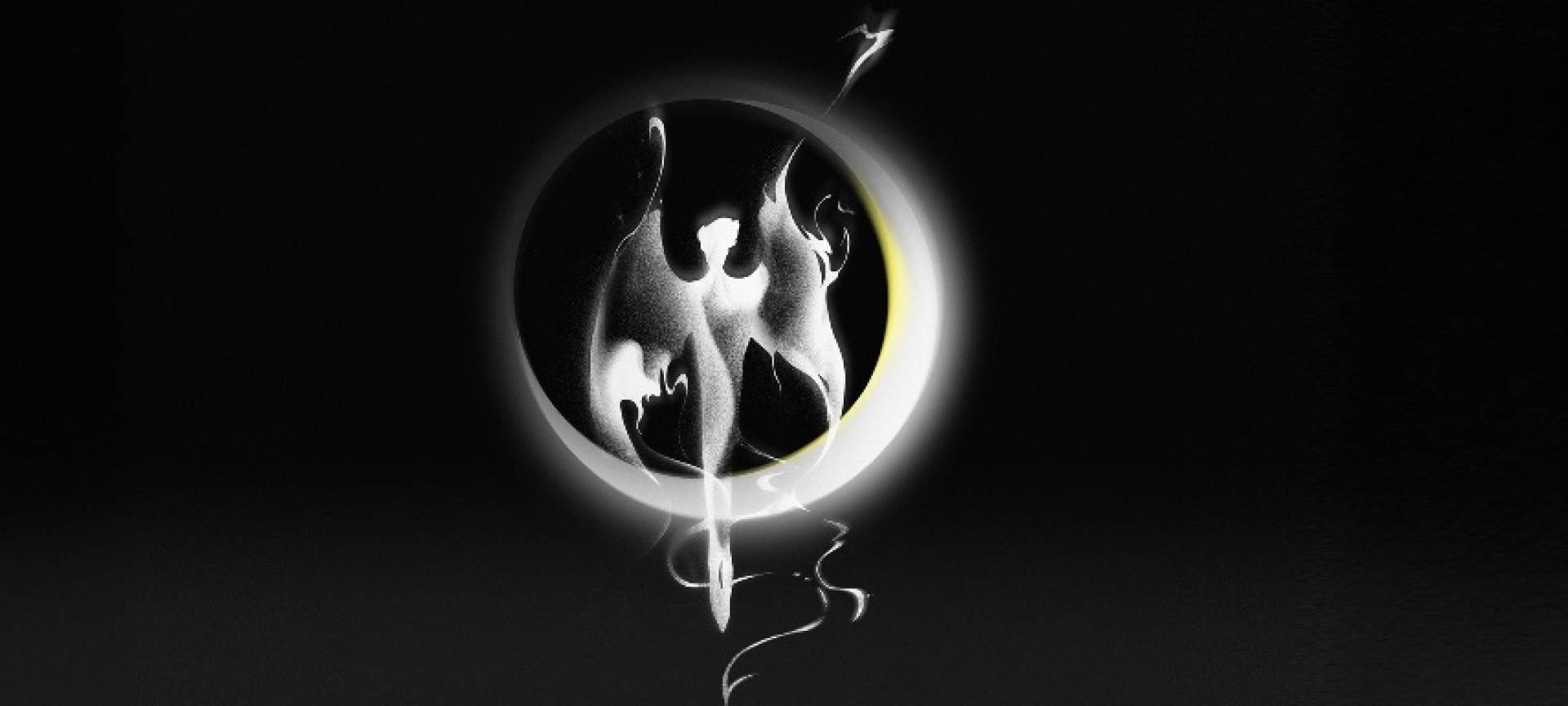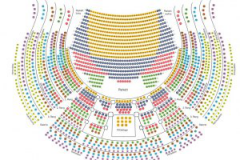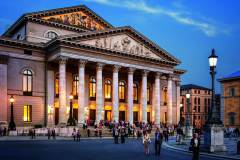The Night Before Christmas
Mo | Tu | We | Th | Fr | Sa | Su |
Composer Nikolai Rimski-Korsakow. Libretto by the composer, based on the eponymous narrative by Nikolai W. Gogol.
recommended for age 10 and older
A true Christmas song. Opera in four acts (1895)
In Russian. With surtitles in German and English. New Production.
A co-production with the Komische Oper Berlin.
When the nights are at their longest, frosty wind and snow storms sweep the land, it is the time of the Koliada – of the pagan winter solstice feast and the Christian-orthodox Christmas celebration in equal measure. In these magical “twelve days of Christmas” the barrier between the human world and the realm of dark beings becomes especially thin. Nikolai Rimsky-Korsakov’s “true” Christmas song, Die Nacht vor Weihnachten, based on the eponymous story by Nikolai Gogol, also plays out in this very same period.
The composer skilfully combines elements of Slavic fairytales and folklore, satirical village comedies and surreal dream worlds with one another, and thus contrasts the Christian Christmas traditions with pagan figures and rituals. In doing so he ties in Christmas with the cycle of the solar year and creates a world in which the Ukrainian Koliada singing (similar to the Christian tradition of carol singing), church bells, devils, witches, nature deities and the battle between bright and dark spirits during the winter solstice, the “birth of the sun”, exist alongside one another.
Humans and supernatural beings clash directly here – a witch, who intends to dissuade her son from a love affair; that son, who as proof of his love for his beloved, intends to procure the Tsarina's golden slippers; a devil, who is angered that the humans no longer fear him; a young woman, trapped in inter-human group dynamics; a kidnapped moon and dancing stars, all embedded in a lively and imaginative world of sound.
Synopsis
Time: 18th century
Place: The village of Dikanka, Ukraine; mid-air; a royal court
Act 1
Tableau 1: Christmas Eve in the hamlet of Dikanka
The widow Solokha agrees to help the Devil steal the moon. The Devil is annoyed with Solokha's son Vakula, who painted an icon mocking him. The Devil decides to create a snowstorm to prevent Vakula from seeing his beloved Oksana. While the storm rages, Solokha rides up to the sky and steals the moon, while the Deacon and Oksana's father, Chub, are unable to find their way.
Tableau 2: Interior of Chub's house
Oksana is alone and lonely at home. She passes through several moods and the music follows her with gradually accelerating tempos. At one point, Vakula enters and watches her admiring herself. She teases him, and he says he loves her, but she replies that she will only marry him if he brings her a pair of the Empress's slippers. Chub comes back out of the storm, and Vakula, not recognizing him and taking him for a rival, chases him out by striking him. Seeing what he has done, Oksana sends Vakula away in a miserable state. Young people from the village come around singing Ukrainian Christmas carols. Oksana realizes she still loves Vakula.
Act 2
Tableau 3: Solokha's house
The Devil is just getting cosy at Solokha's hut when in succession the mayor, the priest and Chub arrive to seduce her each hiding in a sack when the next arrives. Vakula hauls the four heavy sacks to his smithy.
Tableau 4: Vakula's smithy
Vakula puts down his sacks. Young men and women, including Oksana, gather singing Kolyadki and having fun. Vakula, however, is bored and dejected. Oksana taunts Vakula one last time about the Tsaritsa's slippers. Vakula gives his farewell to the lads and to Oksana, exclaiming that he will perhaps meet them in another world. He leaves the sacks - from which the four men emerge.
Act 3
Tableau 5: Inside Patsyuk's house
Patsyuk makes magic vareniki jump into his mouth. Vakula has come to request assistance from him. Patsyuk advises him that in order to obtain the help of the devil, he must go to the devil. Vakula puts down his sack, and the devil jumps out and tries to get his soul in exchange for Oksana. Vakula, however, grabs him by his neck, and climbs on his back. He forces the devil to fly him to St. Petersburg.
Tableau 6: Space. Moon and stars
We witness the charming "Games and Dances of the Stars". This is followed by the "Diabolical Kolyadka" in which Patsyuk, riding a mortar, and Solokha, on her broom, attempt to stop Vakula. He succeeds, however, in getting through, and the lights of St. Petersburg become visible through the clouds.
Tableau 7: A palace. A sumptuous room, brightly lit
The Devil puts down Vakula in the tsaritsa's court and disappears into the fireplace. Vakula joins a group of Zaporozhian Cossacks who are petitioning the tsaritsa. A chorus sings the tsaritsa's praises in a magnificent polonaise. The tsaritsa addresses the Cossacks. Vakula requests the tsaritsa's boots to the music of a minuet, and his wish is granted because of its unusual and amusing nature. The Devil takes Vakula away as Russian and Cossack dances commence.
Tableau 8: Space. Night
Vakula returns home on the devil's back. We witness the procession of Kolyada (young girl in a carriage) and Ovsen (boy on a boar's back). On approaching Dikanka, we hear church bells and a choir.
Act 4
Tableau 9: Christmas Day. Courtyard beside Chub's house
Oksana listens to some women exchanging gossip about Vakula, who is believed to have committed suicide. Alone, Oksana sings an aria expressing her regret that she had treated Vakula harshly, and wishing for his return. He appears with the boots, followed by Chub. Vakula asks Chub for Oksana's hand in marriage and Chub assents. Vakula and Oksana sing a duet. Other characters enter and ask Vakula about his disappearance.
Epilogue: In memory of Gogol
Vakula announces that he will relate his story to the beekeeper Panko the Gingerhead (i.e., Gogol), who will write a story of Christmas Eve. There is general rejoicing.
Program and cast
Conductor: Vladimir Jurowski
Director: Barrie Kosky
Stage Designer: Klaus Grünberg
Costume Designer: Klaus Bruns
Choreographer: Otto Pichler
Chorus: Christoph Heil
Dramaturge: Saskia Kruse
Die Zarin: Violeta Urmana
Der Dorfvorsteher: Sergei Leiferkus
Tschub: Dmitry Ulyanov
Oksana: Elena Tsallagova
Solocha: Ekaterina Semenchuk
Wakula: Sergey Skorokhodov
Panas: Milan Siljanov
Diakon Ossip Nikiforowitsch: Vsevolod Grivnov
Pazjuk: Matti Turunen
Der Teufel: Tansel Akzeybek
Eine Frau mit veilchenblauer Nase: Alexandra Durseneva
Eine Frau mit gewöhnlicher Nase: Laura Aikin
Bayerisches Staatsorchester
Chorus of the Bayerische Staatsoper
National Theatre Munich
The National Theatre Munich (German: Nationaltheater München) is an opera house in Max-Joseph-Platz in Munich, Germany. It is the home of the Bavarian State Opera and the Bayerisches Staatsballett(Bavarian State Ballet).
The Bavarian State Opera also performs in the Prinzregententheater, which opened in 1901 and, like the Bayreuth Festspielhaus, is built to Richard Wagner's specifications, and in the Cuvilliés Theatre at the Residenz, constructed in 1751–1753 and described by Thierry Beauvert as "a Rococo gem".
The Nationaltheater is very easy to get to both by car and by MVV public transportation.
By MVV public transportation
S-Bahn: S 1 - 8 Marienplatz
U-Bahn: U 3, 6 Marienplatz, U 3 - 6 Odeonsplatz
Bus: 52, 131 Marienplatz, 100 Odeonsplatz
Straßenbahn: 19 Nationaltheater
On the day of the performance, holders of regular tickets are entitled to use public transport provided by the Münchner Verkehrsverbund (MVV). This service starts at 3 pm respectively three hours before the performance commences and ends with the closing hour of the MVV.
By Car
Take the Altstadt-Ring to Maximilianstraße.
Parking garage Max-Joseph-Platz: open Monday to Sunday from 6:00 A.M. to 2:00 A.M.
You can take advantage of the special theatre parking fee of Euro 10,- from 6:00 P.M. to 8:00 A.M. by presenting your admission tickets.

 EN
EN DE
DE IT
IT FR
FR ES
ES RU
RU JP
JP RO
RO
 Seating plan
Seating plan 